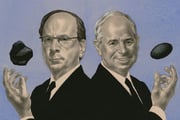
Office address: 345 Park Ave New York, NY 10154
Website: www.blackstone.com
Year established: 1985
Company type: alternative investment management company
Employees: 4,735+
Expertise: alternative investment management, private equity, real estate, infrastructure, life sciences, credit and insurance, energy, technology, healthcare, retail, logistics, hospitality, financial services, digital infrastructure, transportation, media and telecommunications
Parent company: N/A
Key people: Stephen Schwarzman (CEO), Jonathan Gray (COO), Michael Chae (CFO), John Finley (CLO), Vik Sawhney (CAO), John Stecher (CTO), Christine Anderson (global head), Joseph Baratta (global head)
Financing status: N/A
Blackstone is the largest alternative asset manager worldwide with over $1.1 trillion in assets under management. Its head office is in New York with over 4,735 employees across 26 offices globally. Blackstone serves institutional and individual investors by investing in sectors like real estate, private equity, and infrastructure. The firm manages more than 230 portfolio companies and 12,400 real estate assets, delivering long-term value through dynamic growth.
Blackstone was founded in 1985 by Stephen Schwarzman and Peter Peterson to explore opportunities in mergers and acquisitions. In 1987, they launched their first private equity fund, followed by a real estate division in 1991, which became a major driver in their development. By 2007, the firm went public through a $4.13 billion initial public offering and in 2012, expanded into credit investments.
The firm converted to a C-corporation in 2019 to attract more investors and became the largest alternative asset manager worldwide. Their growth continued with key acquisitions like Hilton in 2007 and Ancestry.com in 2020, surpassing $1 trillion in assets by 2023. Blackstone hit a $50 billion milestone with BREIT in 2024, prompting the firm to lift redemption limits.
Blackstone offers a range of investment services across multiple sectors, delivering high-performing solutions to both individual and institutional investors:
In addition to these, the company also emphasizes businesses like Blackstone Growth and Blackstone Energy Transition Partners. The firm aims to deliver excellent results by stewarding capital responsibly for institutional and individual investors.
Blackstone emphasizes more than just hiring, focusing on employee retention and career development. The company values recognizing talent, acknowledging hard work, and rewarding success, fostering a culture grounded in integrity and professionalism. Their employees' dedication was stated to be the key to building their reputation as a trusted partner, which is why they provide the staff with:
The firm is committed to incorporating ESG principles into its investments and operations so that their responsible practices will generate long-term benefits for stakeholders. Blackstone’s ESG focus spans environmental, social, and governance factors, aiming to create sustainable value for both employees and investors. These efforts are evident through various initiatives that address critical global challenges and improve corporate practices:
The company’s diversity, equity, and inclusion (DEI) strategy revolves around its people, with a workforce that reflects varied backgrounds and experiences. Their holistic DEI approach enhances the firm’s culture and strengthens their businesses and communities. With a focus on recruiting, developing talent, community involvement, and accountability, Blackstone aims to create an inclusive environment:
Blackstone’s culture upholds excellence, using global expertise and scale to deliver strong outcomes for clients. The firm operates with integrity, earning trust through careful stewardship of capital. Their entrepreneurial mindset fosters innovation, while diverse teams collaborate to champion the best ideas and celebrate successes.
Stephen A. Schwarzman, co-founder, chair, and CEO of Blackstone, has been instrumental in the firm's growth since its founding. His leadership earned him a seat alongside top US executives at President Xi’s table during key discussions on US-China economic relations in 2023.
Schwarzman is committed to philanthropy, having founded the Schwarzman Scholars program at Tsinghua University. He holds an MBA from Harvard and a BA from Yale.
Blackstone's leadership includes top executives responsible for guiding the company's operations and ensuring its continued growth:
Blackstone is expanding its investor base by launching an infrastructure fund aimed at affluent investors, targeting sectors like energy, transportation, and digital infrastructure. This strategy offers high-net-worth individuals access to private market opportunities that provide stable, long-term returns. By focusing on infrastructure, the firm is tapping into growing demand for investments in clean energy and digital services, traditionally dominated by institutional capital.
The company sees huge potential in the private credit market, predicting it could grow to $30 trillion in the coming years. With increasing demand for alternative financing, particularly as banks face stricter regulations, private credit offers businesses more flexible lending options. Blackstone is capitalizing on this trend by offering direct loans and asset-based financing, aiming to lead the private credit sector.

Fund company ranked in Top 10 most trusted fund firms in recent report.

Landlords backed by private equity shop Blackstone and others avoid capital markets.

They trot out celebrity executives, hold conferences and make sweetened investment offers to bring in private wealth to private equity.

Mutual fund firm plans strategic income and multiasset income funds that will include portion dedicated to total return strategy run by Apollo.

Liquidity, performance concerns and business conflict cause the expanding hedge-fund firm to take a more traditional approach to mutual funds.

Findings in a report by U.S. Treasury and other agencies could spark debate on Wall Street about whether a series of rules implemented under Dodd-Frank have reduced liquidity in the bond market.

Steve Schwarzman and Larry Fink, once partners, now vie for Wall Street dominance atop their wildly successful firms.

Analyst forecasts four or five deals a year, up from the one a year pace since the financial crisis.
A once-in-a-generation change reverberates through the world's economies, from more trucks on the road to the geopolitical balance of power.
More 'alternative' funds with hedging strategies are opening, aiming for smaller investors' dollars
'Alternative' funds come with the same disadvantages hedge funds have: high fees, inconsistent performance and strategies that take a PhD to decipher.
Rare glimpse of pay packages of finance executives
In 2013, when Pimco's Total Return Fund trailed a majority of peers, the money manager paid former CIO Bill Gross a gigantic sum.
Execs replaced over what firm calls intentional errors; REIT king says problems will not affect other related firms. <i>(Plus: <a href="http://www.investmentnews.com/article/20140917/INFOGRAPHIC/140919935" target="_blank">Untangling Schorsch's vast web</a>)</i>
Deal adds $1.5 billion in AUM to N.Y. Life, including $950 million in multi-strategy exchange-traded fund.
